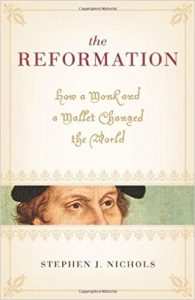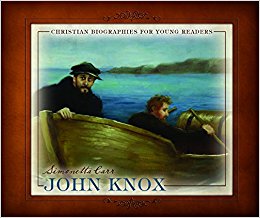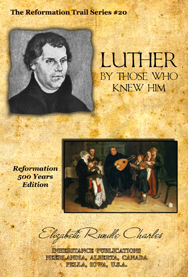 Five hundred years ago, on October 31, 1517, Martin Luther nailed a document onto a cathedral door bulletin board*. That one event, the culmination of years of protest by many, ushered in the Reformation and also, according to Nichols, took the world from the middle ages to modern times.
Five hundred years ago, on October 31, 1517, Martin Luther nailed a document onto a cathedral door bulletin board*. That one event, the culmination of years of protest by many, ushered in the Reformation and also, according to Nichols, took the world from the middle ages to modern times.
But does the Reformation still matter today? That is a question many are debating this year, and this book answers the question by pointing out that, for Christians, history always matters. Not only that, but it can be fun too. The Reformation is the author’s proof.
Does history matter? It did in the Bible, Nichols reminds us. Over and over we are confronted with the fact that when the Old Testament people remembered what God had done in history, things went well. And in the New Testament God, in Jesus, revealed himself in a physical place and real time. Furthermore, the entire Christian faith depends on the historical fact of Christ’s death and resurrection.
As for church history, Nichols makes this claim: Church history is like one grand classroom focused on living out Christ’s command to be disciples in the world and “when we remember the lessons we tend to do well. When we forget or ignore them, we tend to stumble.” We also learn what matters most from those who gave their lives for it, and it is this: the utter supremacy of the gospel in everything the church does.
The Reformation is founded on what have become known as the Five Solas which can be summed up as
- the Bible alone,
- by grace alone,
- through faith alone,
- in Christ alone,
- all and only for God’s glory.
After laying this groundwork, Nichols tells the stories of Luther, Zwingli (currently Miss 17’s favorite reformer), the radical reformers, Calvin, the Anglicans, the Puritans, and women of the reformation. Yes, and it is the stories he tells. Of course, he does also focus on ideas, doctrine, lessons, and major historical events, but he delights in the little anecdotes that bring history to life. As a result, this book is enjoyable and memorable. It is, therefore, an easy way to deepen our understanding of truth in many areas of life and it also functions well as a living textbook for teens.
Unlike some church history texts, The Reformation is neither angry nor purely theoretical. Each of the people or groups highlighted is portrayed sympathetically and with admiration. Nichols also compares the different groups (e.g. the radical reformers focus on human actions while Calvin’s focus is more on God’s actions). From the wisdom of the different reformers we learn more about living for God, the supremacy of the Bible, what Christianity means for daily life, and how we live more fully in this life when we are filled with hope for the next. The Reformers’ devotion to the Lord inspires us to examine our own lives more carefully.
The anecdotes also remind us to live our lives well. One that really struck me, with its many implications for our lives and our understanding of history, is this: Apparently Calvin, unlike the Roman Catholics, locked the church doors after the service. It was his conviction that, after having been fed and equipped, Christians belong in the world.
Other stories appeal to others. Miss 17 enjoyed Zwingli’s daring sausage supper. I learned more about Cranmer and Anne Bradstreet and was reminded to reread the brilliant biography of Calvin’s wife Idelette by Edna Gerstner.
An appendix includes a few of the Ninety-Five Theses, selections from Calvin’s Institutes, and selections from Reformation confessions, catechisms, and prayers.
I heartily recommend The Reformation by Stephen Nichols for personal reading as well as for homeschool church history studies. It is a beautiful way to commemorate this great Reformation anniversary year.
* Do note that the document may not actually have been nailed to the door.
—
If you enjoyed this article, you might want to follow me on Google+ where I often mention helpful or interesting ideas, or connect with me on GoodReads where I share what I read.
Disclosure: I received this ebook last year as part of a free promotion from Crossway and immediately put it on last year’s Christmas wish list since it is easier for my girls to study from a real book. I was thrilled to find it among my other gifts.
This article may be linked to Finishing Strong Raising Homemakers Saturday Reviews , Booknificent Thursdays




